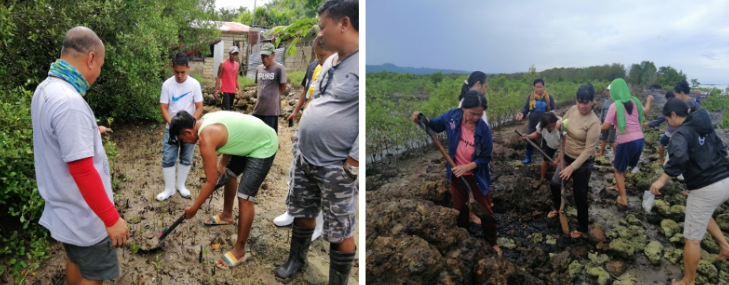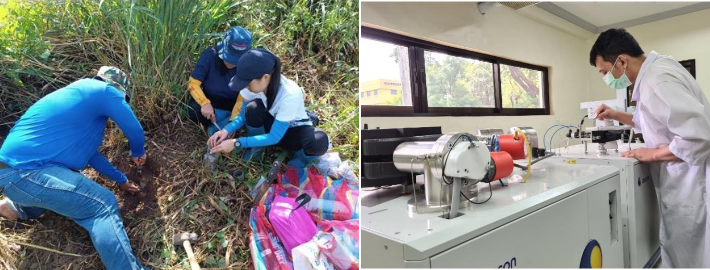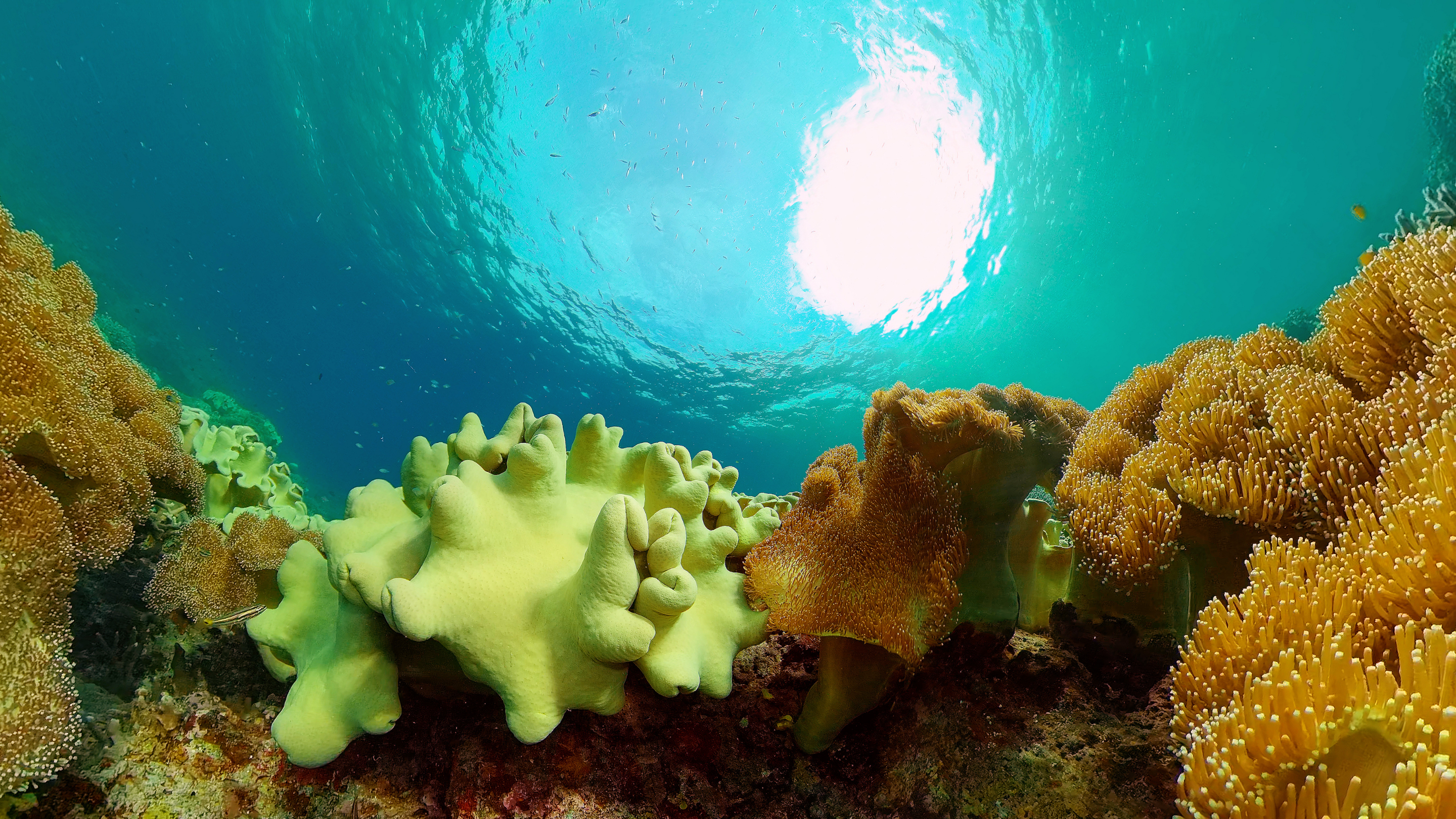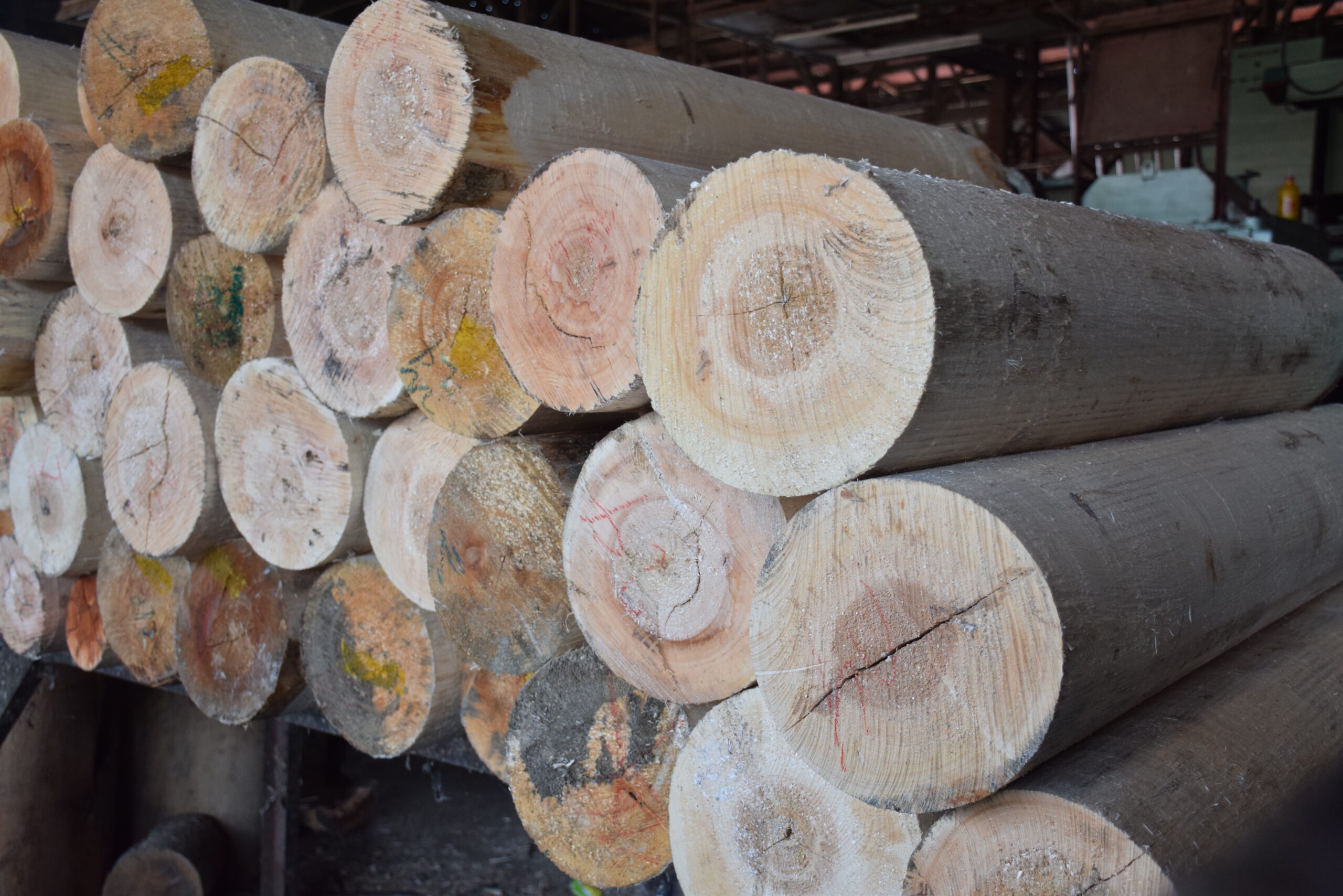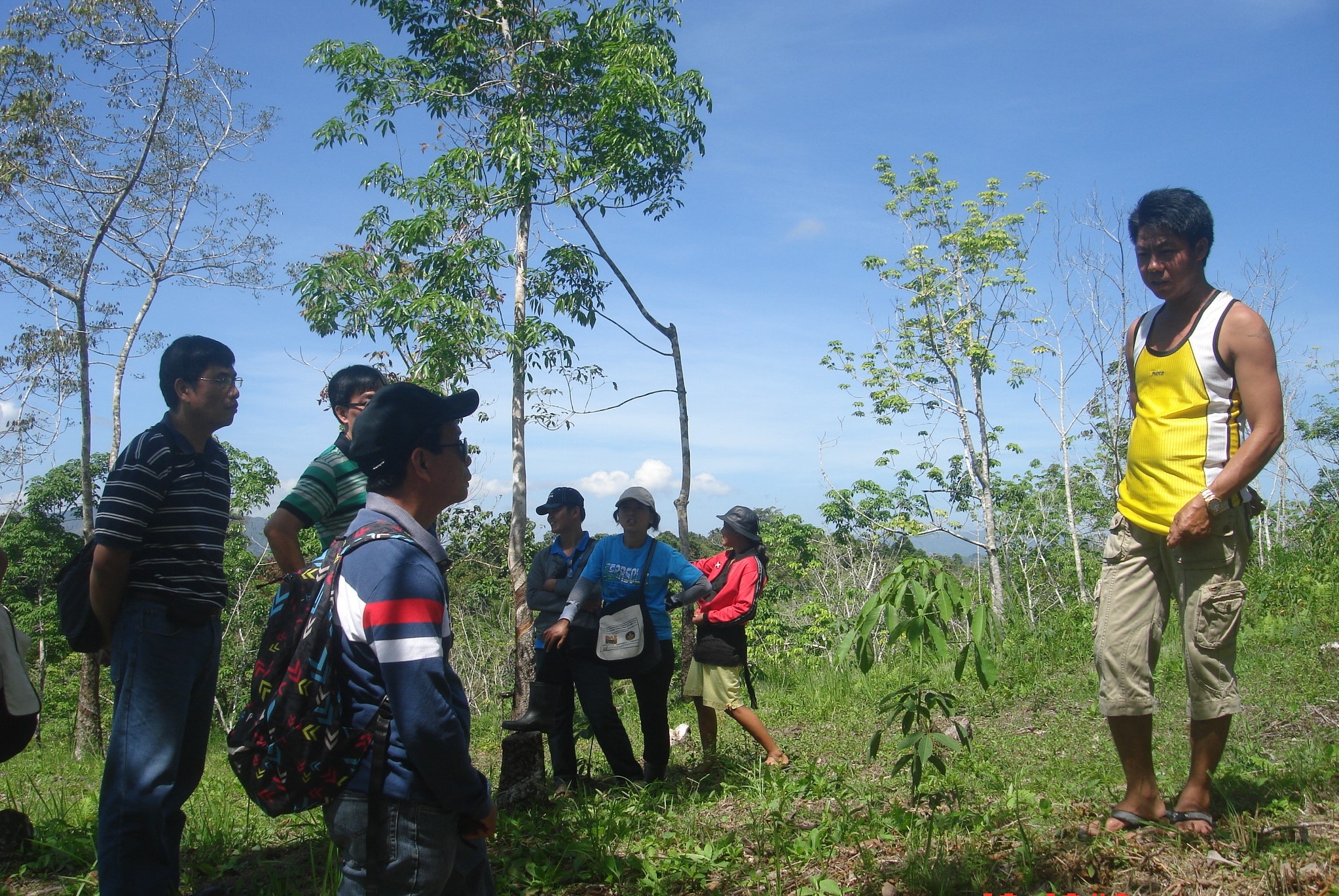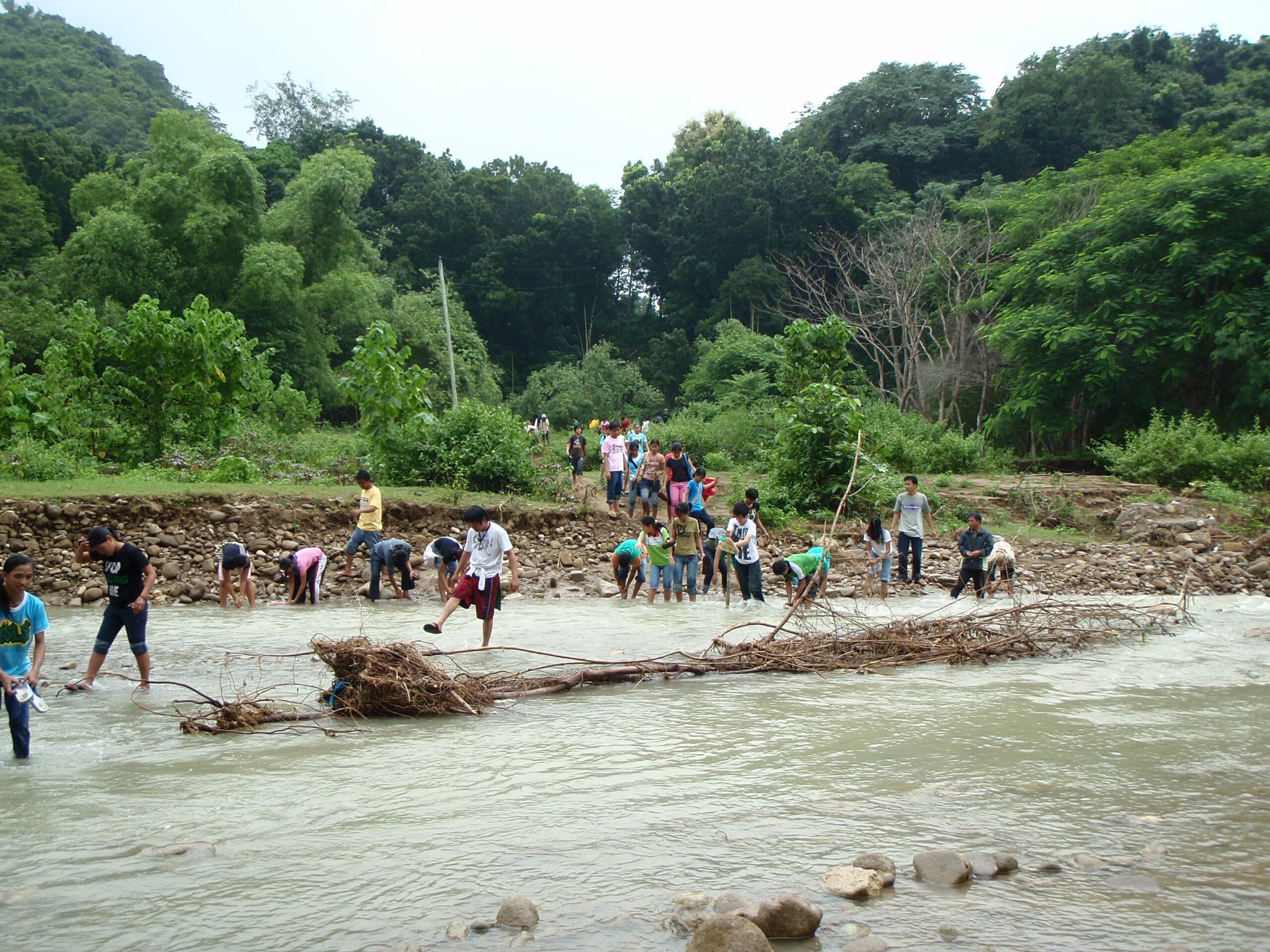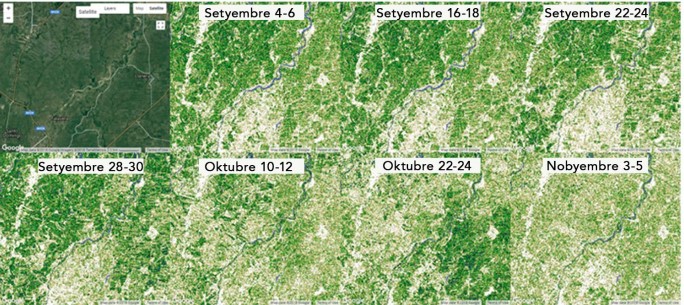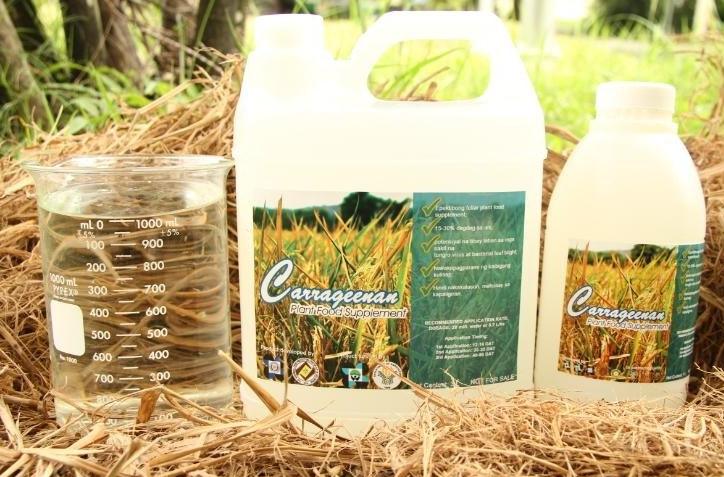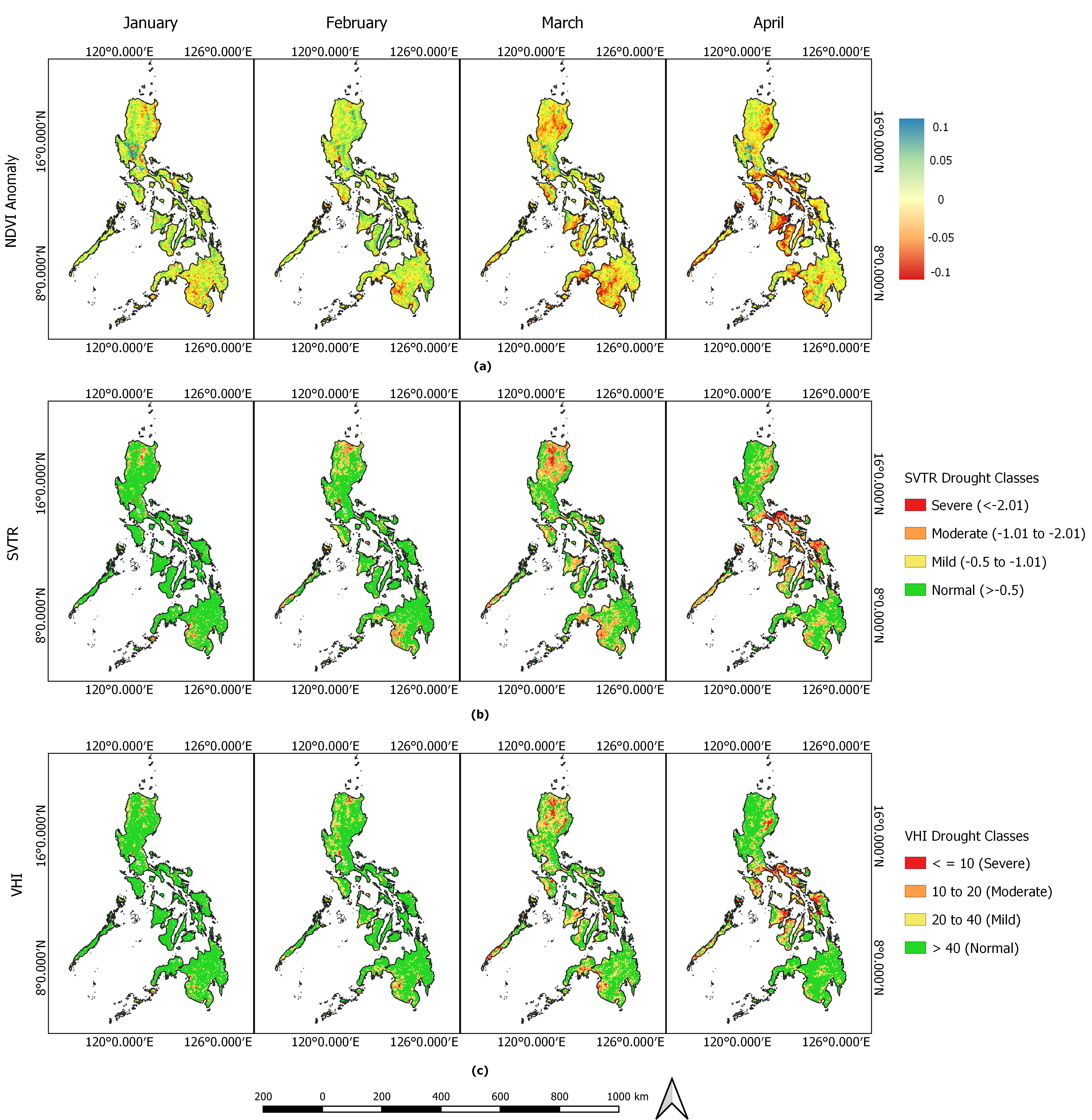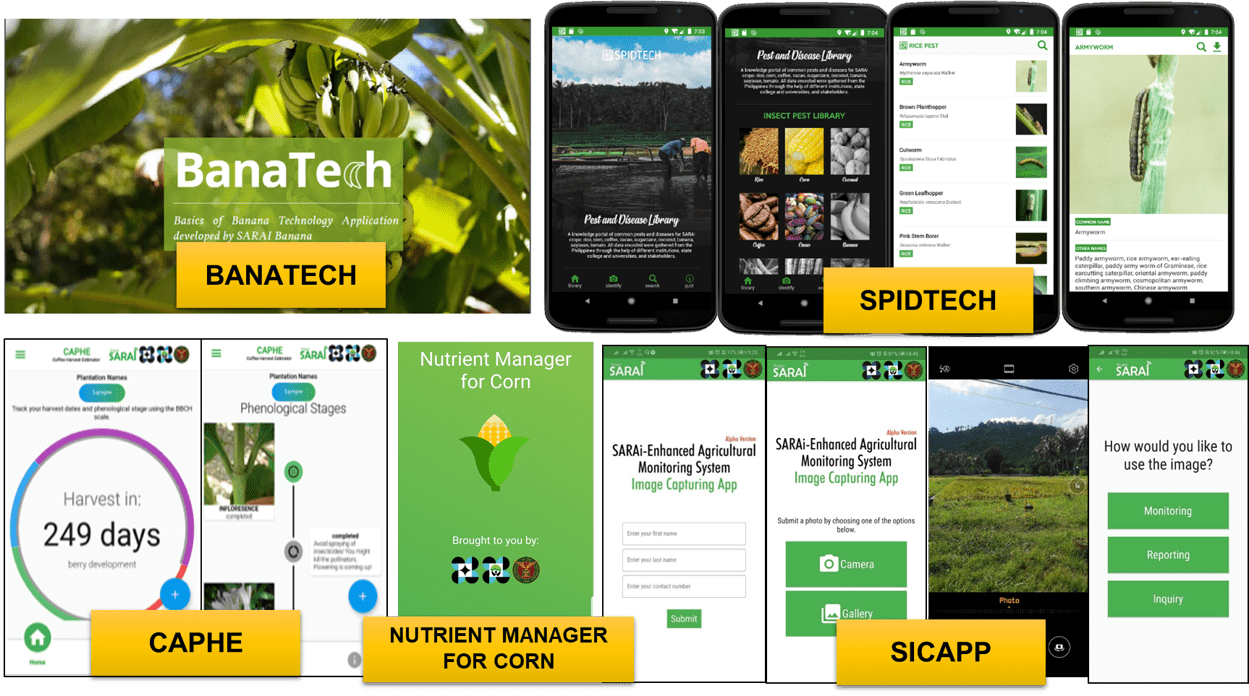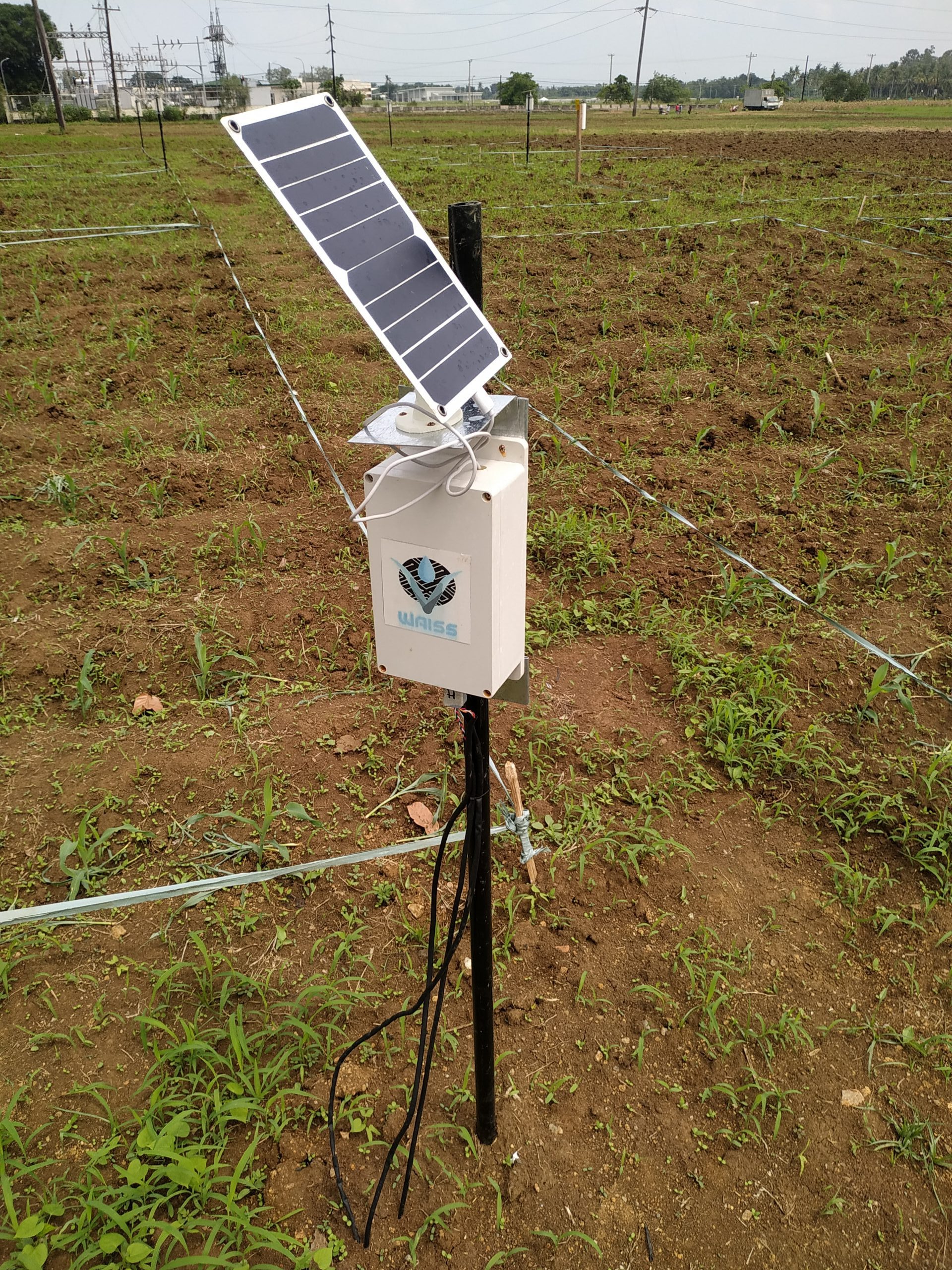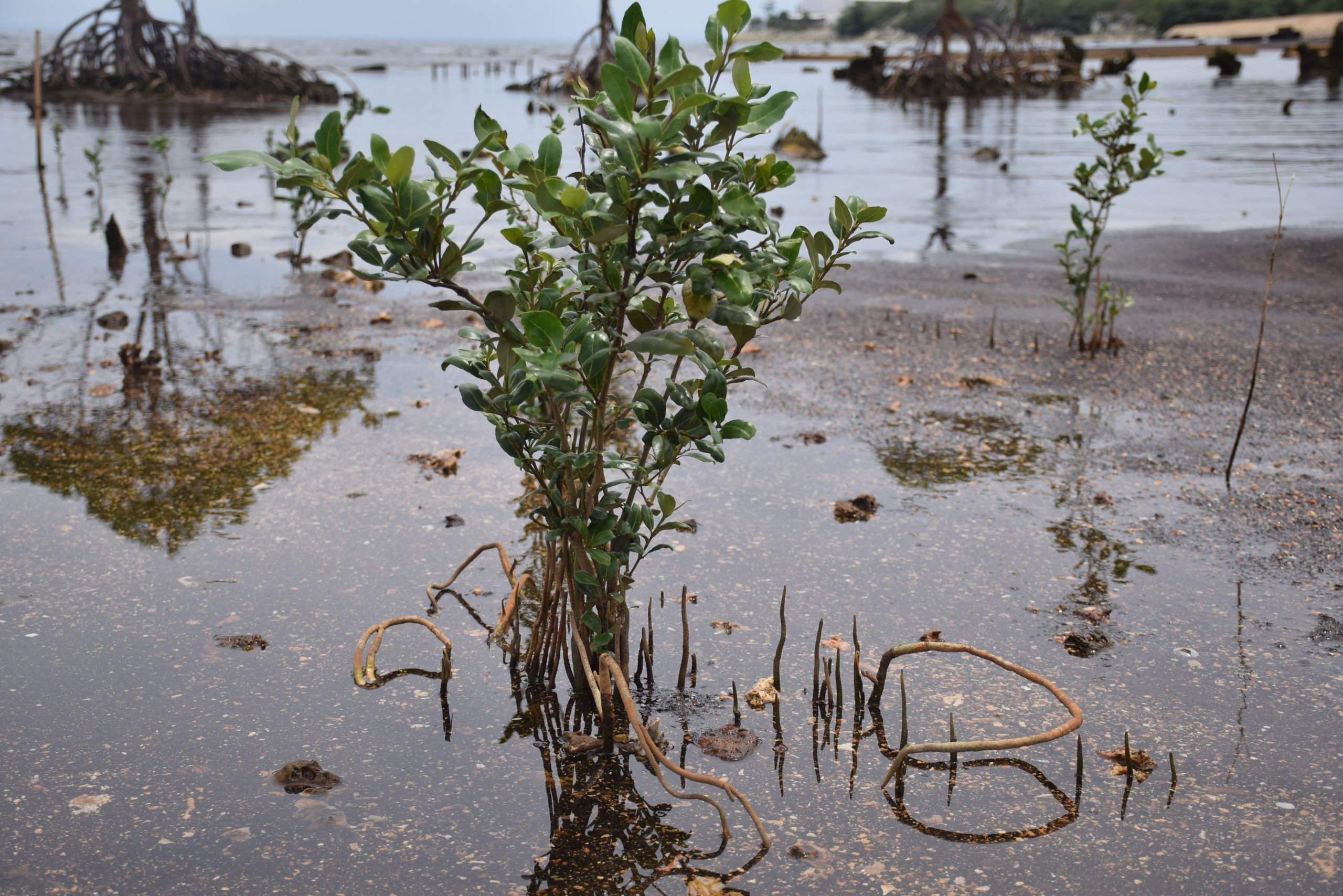Climate Change
Industry Strategic Science and Technology Program
Overview
Climate change is a serious global concern that is considered to be a major threat to agriculture, aquatic and natural resources. Extreme floods and droughts, soil degradation, water shortages, and increased occurrence of destructive pests and diseases as a result of climate change adversely affect agricultural productivity and ecosystem stability, and consequently, food and water security.
With climate change, agriculture is much more erratic and riskier for farmers and fisherfolk. Thus, farm level decisions cannot anymore be based solely on farmers’ past experiences. Climate change impacts also disrupt ecosystem functions leading to degraded forest health, outbreak of pests, diseases, and invasive alien species, among others. Valuable ecosystem services are also hampered affecting people and communities.
From 2010-2019, annual damages due to natural disasters cost billions of pesos – total value of damage to agriculture and aquatic, infrastructure and communication is PhP 463 billion of which, 63% is agriculture’s loss share. These disasters also cost the country approximately PhP145 billion per year until 2050 (IFPRI, 2016). The Philippines has the greatest disaster risk index globally, ranking 1st out of 193 countries with a WorldRiskIndex of 46.86 (World Risk Report, 2023).
With this, the Philippines is one of the countries that signed the Paris Agreement. The central aim is to strengthen the global response to the threat of climate change by keeping a global temperature rise this century well below 2 degrees Celsius above pre-industrial levels and to pursue efforts to limit the temperature increase even further to 1.5 degrees Celsius.
Given this situation, DOST-PCAARRD’s Climate Change (CC) and Disaster Risk Reduction Management (DRRM) agenda seek to sustain the productivity and competitiveness of the AANR sector amidst the changing climate. Research and Development (R&D) initiatives provide a strong empirical basis for Science and Technology (S&T) interventions which are introduced for reliable farm and ecosystem management decisions. With S&T, farmers, environmental managers and other stakeholders are aimed to be equipped with better decision-making tools and information to increase their resilience to climate change.
Climate Change Policies
| Policy Type | Policy Number | Policy Year | Congress | Policy Title | Policy Description | Policy Objective | Policy Link | Commodity | Classification | info_encoder_stamp | info_date_stamp | info_quashing_remarks | filepath |
|---|---|---|---|---|---|---|---|---|---|---|---|---|---|
| Bill | Senate Bill No. 1379 | 2020 | 18th | An Act Integrating The Subject On Climate Change Education Into The Science Curriculum Of Grades 2 To Senior High School Of The Philippine Education System, Both Private And Public, also known as the "Climate Change Education Act" | The Department of Education (DepEd) shall prescribe the integration of Climate Change education under the Science Curriculum of Grades 2 to Senior High School level, in both private and public educational institutions. The instruction of the subject shall include both theoretical and practical components to ensure effective learning and deep understanding of the subject matter. The DepEd shall conduct an annual review of the institutionalization of the Climate Change education in Grades 2 to Senior High School level to ensure its efficient implementation and assess the learning outcome of the students. | This bill seeks to integrate, as mandatory, the subject: Climate Change Education into Science curriculum of Grades 2 to senior high School of the Philippine Education System, in both private and public. | https://www.senate.gov.ph/lisdata/3241029268!.pdf | Climate Change | Null | Jeff | 11/22/2024 | C:\Users\trist\Documents\Formatting\Output\Climate_Change_2024-11-22_processed.xlsx | |
| Bill | Senate Bill No. 992 | 2019 | 18th | An Act Promoting A Low Carbon Economy And Establishing An Emissions Cap-And-Trade System In The Industry Sector To Reduce Greenhouse Gas Emissions And Protecting The Climate, also known as the "Low Carbon Economy Act" | Emission reduction measures shall be adopted by the DENR Secretary to achieve maximum technologically feasible and cost-effective reductions in greenhouse gas emissions. Annual emission reduction targets shall be set for each calendar year by the President, through the Department of Environment and Natural Resource in collaboration with the Department of Trade and Industry, upon consultation with other agencies having jurisdiction over sources of greenhouse gases. Sec 5. Cap on Greenhouse Gas Emissions, - To achieve the emission targets set pursuant to this Act, a cap shall be imposed on the greenhouse gas emissions of the covered sector with the - (a) Highest greenhouse gas emissions; and (b) Most cost-effective opportunities to reduce emissions. Sec. 12. Climate Reinvestment Fund. -There is established a fund known as the Climate Reinvestment Fund consist of the amount of civil penalities assess under this Act. It shall be administered by the DENR to be used exclusively for activities addressing global warming. | This bill seeks to encourage the use of new climate change-related technologies under a cap and trade system that will promote a low carbon economy and quicken the reduction of greenhouse gas emissions, and provide assistance to small farmers in their times of need. | https://www.senate.gov.ph/lisdata/3140128296!.pdf | Climate Change | Null | Jeff | 11/22/2024 | C:\Users\trist\Documents\Formatting\Output\Climate_Change_2024-11-22_processed.xlsx | |
| Bill | House Bill No. 2184 | 2019 | 18th | An Act Promoting A Low Carbon Economy And Establishing An Emissions Cap-And-Trade System In The Industry Sector To Reduce Greenhouse Gas Emissions And Protecting The Climate, also known as the "Low Carbon Economy Act" | Emission reduction measures shall be adopted by the DENR Secretary to achieve maximum technologically feasible and cost-effective reductions in greenhouse gas emissions. Annual emission reduction targets shall be set for each calendar year by the President, through the Department of Environment and Natural Resource in collaboration with the Department of Trade and Industry, upon consultation with other agencies having jurisdiction over sources of greenhouse gases. Sec 5. Cap on Greenhouse Gas Emissions, - To achieve the emission targets set pursuant to this Act, a cap shall be imposed on the greenhouse gas emissions of the covered sector with the - (a) Highest greenhouse gas emissions; and (b) Most cost-effective opportunities to reduce emissions. Sec 8. Trading System. - There shall be established a trading system under which allowances issued under this Act may be sold, exchanged, purchased or traded by any person or entity. Sec. 12. Climate Reinvestment Fund. -There is established a fund known as the Climate Reinvestment Fund consist of the amount of civil penalities assess under this Act. It shall be administered by the DENR to be used exclusively for activities addressing global warming. | This bill aims to introduce the concept of "low carbon economy" which shall pave the way for a cleaner environment by limiting the release of greenhouse gases by the industrial and commercial sector. | http://www.congress.gov.ph/legisdocs/basic_18/HB02184.pdf | Climate Change | Null | Jeff | 11/22/2024 | C:\Users\trist\Documents\Formatting\Output\Climate_Change_2024-11-22_processed.xlsx | |
| Bill | Senate Bill No. 527 | 2019 | 18th | An Act Providing For The Issuance Of A List Of Low-Lying Areas Of The Philippine Territory Vulnerable To Rising Sea Levels As A Result Of Climate Change, And Areas At High Risk For Natural Disasters, Mandating The Department Of Environment And Natural Resources, Department Of Science And Technology, Climate Change Commission And Other Concerned Government Agencies For Its Regular Updating And Appropriating Funds Therefor And For Other Purposes, also known as the "National Hazard Mapping Act of 2019" | Within one (1) year after the effectivity of this Act, the Department of Environment and Natural Resources (DENR), through the National Mapping and Resources Information Authority (NAMRIA), together with the Department of Science and Technology (DOST), Climate Change Commission and National Disaster Risk Reduction and Management Council (NDRRMC) are directed to provide and issue a national disaster map of the Philippines, identifying the low-lying areas vulnerable to rising sea levels as a result of climate change and areas at high risk for natural disasters. It shall contain proper identification of lands bordering sea levels, exposed to volcanic eruption and lying on earthquake faults, with the criteria for evacuation and illustration of recommended evacuation sites and routes. | This bill seeks to identify the low-kying areas vulnerable to rising sea levels, as well as areas at high risk for earthwuakes, volcanic eruption, and other destructive natural disasters. Once identified, the State, through its local units, can make specific preparations for these areas to protect them for when disaster strikes. The State shalll establish an organized and efficient system of evacuation from these areas in the event of imminent danger. | https://www.senate.gov.ph/lisdata/3091027764!.pdf | Climate Change | Null | Jeff | 11/22/2024 | C:\Users\trist\Documents\Formatting\Output\Climate_Change_2024-11-22_processed.xlsx | |
| Bill | Senate Bill No. 216 | 2019 | 18th | An Act Commissioning a Research on Climate Change Drinking Water Adaptation | The Department of Science and Technology (DOST), in cooperation with the Department of Environment and Natural Resources (DENR), shall establish and provide funding for a program of directed and applied research which will be conducted through a non-profit water research foundation. It will be sponsored by drinking water utilities to assist suppliers of drinking water in adapting to the effects of climate change. The amount necessary for the initial implementation of this Act shall be charged against the appropriations of the DOST under the current General Appropriations Act. | This bill aims to sponsor a non-profit water research program which shall conduct partnership research projects to develop a unified program on strategies to combat and address the impacts of climate change. | https://www.senate.gov.ph/lisdata/3047427352!.pdf | Climate Change | Null | Jeff | 11/22/2024 | C:\Users\trist\Documents\Formatting\Output\Climate_Change_2024-11-22_processed.xlsx | |
| Bill | House Bill No. 23180 | 2019 | 18th | An Act Commissioning a Research on Climate Change Drinking Water Adaptation | The Department of Science and Technology (DOST), in cooperation with the Department of Environment and Natural Resources (DENR), shall establish and provide funding for a program of directed and applied research which will be conducted through a non-profit water research foundation. It will be sponsored by drinking water utilities to assist suppliers of drinking water in adapting to the effects of climate change. The amount necessary for the initial implementation of this Act shall be charged against the appropriations of the DOST under the current General Appropriations Act. | This bill proposes an intensive research body that will study and assess the effects of climate change to the water industry and what comprehensive adaptive strategies can be made. | http://www.congress.gov.ph/legisdocs/basic_18/HB03180.pdf | Climate Change | Null | Jeff | 11/22/2024 | C:\Users\trist\Documents\Formatting\Output\Climate_Change_2024-11-22_processed.xlsx | |
| Bill | Senate Bill No. 140 | 2019 | 18th | An Act To Strengthen The Resiliency Of Small Farmers Against Climate Change And Extreme Weather Risks By Establishing The Regulatory Framework And Program For A Free Weather Index-Based Crop Insurance, Providing The Source Of Funding Therefor, And For Other Purposes, also known as "Free Index-Based Agriculture Insurance (Fibai) Act of 2019" | There is herby established a nationwide Free Index-based Insurance for Agriculture (FIBIA) Program. To subsidize the free premiums of farmers under the FIBAI Program, the amount of Six Billion pesos (P6.0 billion) shall be set aside from their current year's unprogrammed Risk Management Fund and/or from the unutilized or unreleased portions of the National Disaster Risk Reduction Funds to form the initial FIBAI Premium Subsidy Fund. All non-life insurance companies authorized to do business in the Philippines are mandated to subscribe to the insurance pool or to ensure that a minimum of five percent (5%) of their gross written premiums shall be in the agriculture sector. | The bill aims to institute measures needed to effectively establish the weather index-based insurance service in the Philippines, ensure the access initially of the 2.4 million rice farmers to an innovation risk sharing arrangement aimed at enhancing their capacity to deal with extreme adverse weather events. PAGASA shall provide adequate, up-to-date, and timely information on atmospheric, astronomical, and other weather related phenomena as well as assessments pertinent to climate change adaptation programs, such as weather index-based insurance. The FIBAI Program shall be implemented by city and municipal LGUs for the farmers and farm crops within their areas of jurisdiction. | https://www.senate.gov.ph/lisdata/3039827275!.pdf | Climate Change | Null | Jeff | 11/22/2024 | C:\Users\trist\Documents\Formatting\Output\Climate_Change_2024-11-22_processed.xlsx | |
| Bill | (1) House Bill No. 233 (2) House Bill No. 401 (3) House Bill No. 1136 (4) House Bill No. 3310 | 2019 | 18th | An Act To Support Small Farmers Against Climate Change Risks By Establishing A Program To Provide Free Weather Index-Based Insurance For Agriculture And Fisheries, Providing The Source Of Funding Therefor, And For Other Purposes, also known as "Free Index-Based Agriculture Insurance (Fibai) Act of 2019" | There is hereby established a nationwide Free Index-based Insurance for Agriculture (FIBIA) Program. (1) To subsidize the free premiums of farmers under the FIBAI Program, the amount of Ten Billion pesos (P10.0 billion) shall be set aside from their current year's unprogrammed Risk Management Fund and/or from the unutilized or unreleased portions of the National Disaster Risk Reduction Funds to form the initial FIBAI Premium Subsidy Fund. All non-life insurance companies authorized to do business in the Philippines are mandated to subscribe to the insurance pool or to ensure that a minimum of five percent (5%) of their gross written premiums shall be in the agriculture sector. (2) To subsidize the free premiums of farmers under the FIBAI Program, the amount of P5.8 billion shall be set aside from their current year's unprogrammed Risk Management Fund and/or from the unutilized or unreleased portions of the National Disaster Risk Reduction Funds to form the initial FIBAI Premium Subsidy Fund. There is hereby created an Index-based Risk Mitigation Fund. (3) To subsidize the free premiums of farmers under the FIBAI Program, the amount of Six Billion pesos (P6.0 billion) shall be set aside from their current year's unprogrammed Risk Management Fund and/or from the unutilized or unreleased portions of the National Disaster Risk Reduction Funds to form the initial FIBAI Premium Subsidy Fund. All non-life insurance companies authorized to do business in the Philippines are mandated to subscribe to the insurance pool or to ensure that a minimum of five percent (5%) of their gross written premiums shall be in the agriculture sector. (4) To subsidize the free premiums of farmers under the FIBAI Program, the amount of Six Billion pesos (P6.0 billion) shall be set aside from their current year's unprogrammed Risk Management Fund and/or from the unutilized or unreleased portions of the National Disaster Risk Reduction Funds to form the initial FIBAI Premium Subsidy Fund. All non-life insurance companies authorized to do business in the Philippines are mandated to subscribe to the insurance pool or to ensure that a minimum of five percent (5%) of their gross written premiums shall be in the agriculture sector. | This bill seeks to help farmers and agricultural producers withstand the adverse impact of disastrous weather events, facilitate their prompt recovery from crop damage/devastation which have often led to uncompensated losses, heavy financial burden, and unpaid debts by way of innovative risk sharing mechanisms, specifically weather index based crop insurance programs, | http://www.congress.gov.ph/legisdocs/basic_18/HB00233.pdf http://www.congress.gov.ph/legisdocs/basic_18/hb00401.pdf http://www.congress.gov.ph/legisdocs/basic_18/HB01136.pdf http://www.congress.gov.ph/legisdocs/basic_18/HB03310.pdf | Climate Change | Null | Jeff | 11/22/2024 | C:\Users\trist\Documents\Formatting\Output\Climate_Change_2024-11-22_processed.xlsx | |
| Bill | House Bill No. 5549 | 2019 | 18th | An Act Integrating Into The Curriculum Of The Senior High School Level Of The Philippine Educational System, Both Private And Public, A Mandatory Subject Or Course On Climate Change Education, also known as the "Climate Change Education Act of 2019" | The Department of Education (DepEd) shall prescribe a mandatory subject or course in Climate Change Education for senior highschool students. The instruction of the subject shall include both theoretical and practical components to ensure effective learning and deep understanding of the subject matter. | This bill aims to inculcate climate change awareness among the youth by mandating schools to include in their curricula a subject or course on cliamte change in the senior high school level. Every youth and student should be able to appreciate the importance of theoretical and practice components of climate change education. | http://www.congress.gov.ph/legisdocs/basic_18/HB05549.pdf | Climate Change | Null | Jeff | 11/22/2024 | C:\Users\trist\Documents\Formatting\Output\Climate_Change_2024-11-22_processed.xlsx | |
| Bill | House Bill No. 2184 | 2019 | 18th | An Act Imposing Climate Tax on Electric Power Consumption, also known as the "Piso Para sa Kalikasan Act" | Amount of Climate Tax - The amount of Climate Tax on Electricity (CTE) shall be equal to One Peso (P1.00) per one kilogram of CO2e. CTE shall be imposed on the monthly electric power consumption per electrict utility bill of every Residential user of electric power utilities in proportion to the CO2 emission generated from electricity consumed. Exemptions: a. monthly bill does not exceed 60 kilowatt hour; or b. any form of renewable energy is used | This bill recognizes the unfortunate status quo of the environment and encourages every Filipino to act. The proceeds of the fund shall be used to explore alternative and cleaner sources of energy, proved better public transportation, and disseminate climate change awareness. | http://www.congress.gov.ph/legisdocs/basic_18/HB01245.pdf | Climate Change | Null | Jeff | 11/22/2024 | C:\Users\trist\Documents\Formatting\Output\Climate_Change_2024-11-22_processed.xlsx | |
| Bill | House Bill No. 4261 | 2019 | 18th | An Act Requiring All Deep-Well Owners And Operators, Including Applicants For Water Extraction Permits To Incorporate, Construct And Install Artificial Recharge Wells So That The Water They Extract From The Aquifers Will Be Replenished Thus Helping Mitigate The Effects Of The El Niño, Climate Change And Other Problems On Fresh Water, And For Other Purposes, also known as the "Aquifer Protection and Conservation Act of 2019" | The National Water Resources Board (NWRB) shall be the lead agency designated to implement the protection and conservation of the country's aquifers as a system for the storage and supply of sustainable potable water for domestic, agricultural, commercial and industrial uses through the harvesting of rainwater and artificial recharging of the aquifers with the same. The NWRB in coordination with the DA, DENR, DOST, and the DPWH, with the participation of concerned committees from the House of Representatives and the Senate, shall promulgate the IRR for the proper implementation of this Act. | This bill seeks to institute urgent mitigating measures to harvest, store, and utilize rainwater to soften the impact of climate change, El Nino, tropical storms, super typhoons, natural phenomena and problems caused by excessive subsurface water extraction. | http://www.congress.gov.ph/legisdocs/basic_18/HB04261.pdf | Climate Change | Null | Jeff | 11/22/2024 | C:\Users\trist\Documents\Formatting\Output\Climate_Change_2024-11-22_processed.xlsx | |
| Bill | House Bill No. 4445 | 2019 | 18th | An Act Creating The National Rainwater Harvesting Board Under The Office Of The President For The Purpose Of Promotion, Development And Utilization Of Rainwater Harvesting Technology As A Measure To Mitigate The Effects Brought About By Climate Change And Extreme Weather Phenomena Like Super Typhoons And The El Niño That Are The Causes Of Downstream Flooding, Severe Drought And Other Problems On Fresh Water, And For Other Purposes | The National Rainwater Harvesting Board is hereby created under the Office of the President which shall be composed of representatives from the DENR, DA, DOST, DPWH, DILG, representatives form LGUs, NGOs, Pos, and other stakeholders in support to the government's water conservation measures. The Board shall formulate its own rules and regulations for the successful implementation of this order subject. | This bill aims to create the National Rainwater Harvesting Board dedicated to the science of rainwater harvesting. | http://www.congress.gov.ph/legisdocs/basic_18/HB04445.pdf | Climate Change | Null | Jeff | 11/22/2024 | C:\Users\trist\Documents\Formatting\Output\Climate_Change_2024-11-22_processed.xlsx | |
| Bill | (1) House Bill No. 6131 (2) House Bill No. 8203 | 2017 | 17th | An Act Creating The Department Of Climate Change, Appropriating Funds Therefor, And For Other Purposes | There is hereby created the Department of Climate Change which shall prepare, integrate, coordinate, supervise, control all plans, programs, projects and activities of the Government relative to mainstreaming of climate change, DRRM and CCA. The Department shall assume the powers and functions of the National Disaster Risk Reduction and Management Council (NDRRMC) and the Office fo the Civil Defense (OCD) under RA 10121. The Department shall also assume the powers and functions of the Climate Change Commission under RA 10174. | This bill seeks to create an accountable, independent, focused, and specialized single government agency, the Department of Climate Change, that will function not only after the occurance of disaster, but will work all-year-round to build the country's capacity and management of climate change. This bill shall emphasize the importance of climate change resiliency and adaptation measures. | http://www.congress.gov.ph/legisdocs/basic_17/HB06131.pdf | Climate Change | Null | Jeff | 11/22/2024 | C:\Users\trist\Documents\Formatting\Output\Climate_Change_2024-11-22_processed.xlsx | |
| Bill | Senate Bill No. 651 | 2016 | 17th | An Act Establishing The National Coastal Greenbelt Program, Providing Funds Therefor, And For Other Purposes, also known as the "National Coastal Greenbelt Act" | Taking the lead, the Climate Change Commission shall identify and convene all national agencies responsible for foreshore management, mangrove and beach forest protection and utilization, coastal land and sea-use planning, coastal tourism development, social welfare of coastal communities, and other relevant mandates to prepare and integrated National Coastal Greenbelt Action Plan (NCGAP). Each coastal municipality and city in the identified priority coastal greenbelt areas in the action Plan shall prepare a Local Coastal Greenbelt Action Plan (LCGAP). The National Coastal Greenbelt Program mandates the establishment of 100-meter protection zones, initially for the Eastern Pacific seaboard, where typhoons make landfall. | This bill aims to create a National Coastal Greenbelt Program, a science-based and ocst-effective program, which shall establish coastal greenbelts that will transform vulnerable coastal villages into highly resilient sustainbale communities. | https://www.senate.gov.ph/lisdata/2413920776!.pdf | Climate Change | Null | Jeff | 11/22/2024 | C:\Users\trist\Documents\Formatting\Output\Climate_Change_2024-11-22_processed.xlsx | |
| Bill | Senate Bill No. 434 | 2016 | 17th | An Act Promote Greening And Forestland Rehabilitation And Protection In The Barangay Level, Spurring Local Climate Change Action, Appropriating Funds Therefor And For Other Purposes | DENR and LGUs, in consultation with other government agencies, local communities, non-government organizations, academic and research institutions, and other sectors, shall jointly undertake the planning, formulation and implementation of local greening and forest land rehabilitation and protection programs. Forest land rehabilitation programs shall include the conservation, management and development of forest resources and biodiversity. Local greening programs shall aim to build, develop and maintain forest parts in provincial, city, municipal, barangay parks, roads, elementary school grounds and other public open spaces where appropriate. Forestry, natural resources, agricultural and fisheries schools, both public and private, shall participate in the national and local implementation and monitoring of this Act. The DENR shall provide technical assistance for capacity building of participating educational institutions. | This bill seeks to address one of the drivers of our vulnerability to disasters and climate change -- ecosystems decline. This recognizes the role of local governments as frontline agencies in the formulation and implementation of climate change action, as it empowers local officials to advance greening and rehabilitation and protection of forestlands as a priority adaptation strategy from the provincial to the barangay level. | https://www.senate.gov.ph/lisdata/2387020650!.pdf | Climate Change | Null | Jeff | 11/22/2024 | C:\Users\trist\Documents\Formatting\Output\Climate_Change_2024-11-22_processed.xlsx | |
| Bill | House Bill No. 397 | 2016 | 17th | An Act Enhancing The Inclusiveness And Strengthening The Disaster Risk Reduction-Climate Change Adaptation Linkages, Thereby Amending Republic Act No. 10121, Or The Philippine Disaster Risk Reduction Management Act Of 2010, Increasing Appropriations Therefor And For Other Purposes | The proposed measure fine-tunes the key provisions of RA 10121 by inserting specific amendments therein addressing the following concerns identified by the CSO sunset review process: 1. Improving the current institutional structure for better implementation of the law 2. Clarifying the various elements for a successful effort in preparedness 3. Setting out other elements that need to be looked into when it comes to response 4. Identifying further measures in adaptation and mitigation 5. Improved rehabilitation and recovery 6. Making funding and its mechanisms more responsive | This bill aims to enhance and widen the scope of RA 10121 thereby including the development of policies and plans for the rehabilitation and climate change adaptation and mitigation.This also incorporates the Sendai Framework of Action from Japan and the UN Framework Convention on Climate Change on Disaster Risk Reduction-Cliamte Change Adaptation and Loss and Damage in the creation and implementation of national, regional, and local sustainbale development property and pverty reduction strategies, policies, plans, and budgets. | http://www.congress.gov.ph/legisdocs/basic_17/HB00397.pdf | Climate Change | Null | Jeff | 11/22/2024 | C:\Users\trist\Documents\Formatting\Output\Climate_Change_2024-11-22_processed.xlsx | |
| Bill | House Bill No. 2969 | 2016 | 17th | An Act To Establish A Coastal Climate Change Adaptation Program For Coastal Local Government Units (Clgus) By Providing Them Financial And Technical Assistance, also known as the "Coastal Climate Change Adaptation Program of 2016" | This bill aims to develop national and local adaptation strategies to improve the ability of coastal inhabitants to cope with the impact of climate change. The DILG shall establish a Coastal Climate Change Adaptation Program and issue guidelines for the implementation of the grant program. The DILG Secretary may make grant to any Coastal LGUs for the purpose of developing climate change adaptation plans. | This bill aims to develop national and local adaptation strategies to improve the ability of coastal inhabitants to cope with the impact of climate change. The challenge now is to create integrated and holistic strategies to ensure everyone's security when facing the challenges that climate change wil bring. | http://www.congress.gov.ph/legisdocs/basic_17/HB02969.pdf | Climate Change | Null | Jeff | 11/22/2024 | C:\Users\trist\Documents\Formatting\Output\Climate_Change_2024-11-22_processed.xlsx | |
| Bill | House Bill No. 4246 | 2016 | 17th | An Act To Integrate Lessons On Climate Change And Environmental Protection In The Curriculum Of Basic Education, also known as the "Climate Change and Environmental Protection Education Act of 2016" | DEPED is hereby mandated to include the appropriate subjects of the curriculum of basic education (Kindergarter to Senior High School) lessons on climate change and environmental protection. Such lessons shall emphasize how our school children could be of assistance in protecting our environment. | This bill seeks to integrate lessons on climate change and environmental protection in the curriculum of basic education. | http://www.congress.gov.ph/legisdocs/basic_17/HB04246.pdf | Climate Change | Null | Jeff | 11/22/2024 | C:\Users\trist\Documents\Formatting\Output\Climate_Change_2024-11-22_processed.xlsx | |
| Joint Memorandum Circular | DBM-CCC-DILG Joint Memorandum Circular No. 2015-01 | 2015 | Null | Revised Guidelines for Tagging/Tracking Climate Change expenditures in the Local Budget (Amending JMC 2013-01) | Amendments: 1. Submission by the LGU of electronic copy of their climate change expenditure tagged Annual Investment Program (AIP) directly to the CCC, in addition to the DBM and DILG during the budget preparation process; 2. Transferring the responsibility of operation the CCT helpdesk from the DILG to the CCC; 3. Streamlining the CC typologies by simplifying, consolidating, and eliminating redundant typologies to be consistent with the national typologies; and 4. Introduction of the Quality Review and Assurance tool to ensure quality of the climate change expediture data | The joint memorandum circular seeks to amend the initial guidelines on the tagging/tracking of climate change expenditures in the local budgets. In addition to the initial purpose of the guidelines, it also aims to clarify and spell out responsibilities among LGUs, DBM, CCC, and DILG relative to the tagging of climate change expenditures in the Annual Investment Program of LGUs. | https://www.dbm.gov.ph/wp-content/uploads/Issuances/2015/Joint%20Memorandum%20Circular/NEW_JMC_DBM-CCC-DILG%20NO.%202015%20-%2001%20DATED%20JULY%2023,%202015.pdf | Climate Change | Null | Jeff | 11/22/2024 | C:\Users\trist\Documents\Formatting\Output\Climate_Change_2024-11-22_processed.xlsx | |
| Proclamation | Proclamation No. 1160 | 2015 | Null | Declaring November 25 of every year as the National Day for Youth in Climate Action | The National Youth Commission (NYC), in coordination with the CCC and other concerned agencies, shall determine the theme and identify the programs, projects, and activities for the yearly observance and celebration of the National Day for Youth in Climate Action. All other agencies and instrumentalities of the National Government, including government-owned or -controlled corporations, are hereby directed and all local government units, as well as the private sector, are hereby encouraged to collaborate and cooperate with the NYC in advocating and implementing programs and activities pursuant to this Proclamation. | This proclamation adheres to the Philippine Youth Development Plan 2012-2016 formulated by the National Youth Commission (NYC), which seeks to strengthen disaster risk reduction and management and climate change initiative especially in the area of humanitarian response for the youth in times of calamities. | https://www.officialgazette.gov.ph/2015/11/12/proclamation-no-1160-s-2015/ | Climate Change | Null | Jeff | 11/22/2024 | C:\Users\trist\Documents\Formatting\Output\Climate_Change_2024-11-22_processed.xlsx | |
| Bill | House Bill No. 3987 | 2015 | 16th | An Act Establishing The Philippine Academy For Climate Change Adaptation And Disaster Risk Reduction, Defining Its Powers And Functions, Appropriating Funds Therefor And For Other Purposes | The Philippine Academy For Climate Change Adaptation And Disaster Risk Reduction shall serve as a training school for the participants to learn about the theory and prqactice of climate change adaptation and disaster resilient development. It shall provide and implement a curriculum for climate change adaptation and disaster risk reduction as well as conduct seminars, workshops, adn other training programs to enhance and upgrade climate chnage adaptation and disaster risk reduction knowledge, capabilities and efficience, and shall perform such other functions as may be necessary in carrying out its mandate. The Clark Development Corporation shall set aside 5,000 sqm area inside the Clark Freeport Zone for the use of the academy. | This bill aims to establish the Philippine Academy For Climate Change Adaptation And Disaster Risk Reduction to provide students an opportunity to learn from experienced trainers and local communities about both the theory and rpactice of disaster risk reduction and climate change adaptation. | http://www.congress.gov.ph/legisdocs/basic_16/HB03987.pdf | Climate Change | Null | Jeff | 11/22/2024 | C:\Users\trist\Documents\Formatting\Output\Climate_Change_2024-11-22_processed.xlsx | |
| Resolution | Housing and Land Use Regulatory Board (HLURB) Resolution No. 915 | 2014 | Null | Approving the Supplemental Guidelines for Mainstreaming Climate change Adaptation and Disaster Risk Reduction in the Comprehensive Land Use Plan | It is hereby resolved that the "Supplemental Guidelines for Mainstreaming Climate change Adaptation and Disaster Risk Reduction in the Comprehensive Land Use Plan", an integral component of the land use planning processes as outlined in the CLUP Guidebooks, Volumes 1 to 5 be approved as the same is hereby approved. | This order approves the supplemental guidelines on mainstreaming climate and disaster risks in the Comprehensive Land Use Plan (CLUP) which will provide a process of understanding climate and disaster risks and make them part of land use and allocation and zoning decisions. | http://hlurb.gov.ph/wp-content/uploads/Board%20Resolutions/2014%20%20Board%20Resolutions/R-915%20s.%202014.pdf | Climate Change | Null | Jeff | 11/22/2024 | C:\Users\trist\Documents\Formatting\Output\Climate_Change_2024-11-22_processed.xlsx | |
| Guidelines/Strategy | NA | 2014 | Null | Supplemental Guidelines for Mainstreaming Climate change Adaptation and Disaster Risk Reduction in the Comprehensive Land Use Plan | The Supplemental Guidelines for Mainstreaming Climate change Adaptation and Disaster Risk Reduction in the Comprehensive Land Use Plan will help local governments formulate climate and disaster risk-sensitive comprehensive land use plans and zoning ordinances that would guide the allocation and regualtion of land use so that exposure and vulnerability of population, infrastructure, economic activities and the environment to natural hazards and climate change can be minimize or even prevented. The resulting improvements in land use planning and zoning processes will strengthen the ability of local governments to achieve their sustainable development objectives given the challenges posed by climate change and natural hazards. | These guidelines aims to mainstream climate and disaster risks in the Comprehensive Land Use Plan (CLUP) to ensure that appropriate policies, strategies and interventions are put in place to increase adaptive capacities and resilience of our communities from a rapidly changing environment. | https://tuewas-asia.org/wp-content/uploads/2017/06/Supplemental-Guidelines-on-Mainstreaming-Climate-Change-and-Disaster.pdf | Climate Change | Null | Jeff | 11/22/2024 | C:\Users\trist\Documents\Formatting\Output\Climate_Change_2024-11-22_processed.xlsx | |
| Executive Order | Executive Order No. 174 | 2014 | Null | Institutionalizing the Philippine Greenhouse Gas Inventory Management and Reporting System (PGHGIMRS) | The Philippine Greenhouse Gas Inventory Management and Reporting System (PGHGIMRS) is hereby established to institutionalize the GHG inventory management and reporting system in relevant government agencies to enable the country to transition towards a climate-resilient pathway for sustainable development. The Climate Change Commission (CCC) shall be the overall lead in the implementation of this Order. It shall be responsible for the following: a) Provide direction and guidance in the accounting and reporting of GHG emissions from identified key source sectors in order to develop and maintain centralized, comprehensive, and integrated data on GHGs; b) Develop a system for the archiving, reporting, monitoring, and evaluating GHG inventories in all key sectors; and c) Provide and facilitate continuous capacity building initiatives in the conduct of GHG inventories to ensure application of updated methodologies. | This Order adheres to the National Climate Change Plan which identified the implementation of a national system for the archiving, reporting, monitoring, and evaluating greenhouse gas (GHG) emissions as an activity that can support better planning for climate change adaptation and mitigation actions. | https://www.officialgazette.gov.ph/2014/11/24/executive-order-no-174-s-2014/ | Climate Change | Null | Jeff | 11/22/2024 | C:\Users\trist\Documents\Formatting\Output\Climate_Change_2024-11-22_processed.xlsx | |
| Bill | Senate Bill No. 1894 | 2013 | 16th | An Act Directing The Secretary Of Health To Develop A National Strategic Action Plan To Assist Health Professionals In Preparing For And Responding To The Public Health Effects On Climate Change, also known as the "Climate Change Health Protection and Promotion Act" | The Secretary of Health shall publish a strategic action plan to assist health professionals in preparing for and responding to the impacts of climate change on public health in the Philippines and other nations. The Secretary shall assist health professionals in preparing for and responding effectively and efficientlt to the health effects of climate change through measures stated in the Act. | This bill aims to assist the efforts of public health and health care professionals, first responders, provinces, cities, municipalities, and local communities to incorporate measures to prepare health systems to respond to the impacts of climate change. | https://www.senate.gov.ph/lisdata/1813015375!.pdf | Climate Change | Null | Jeff | 11/22/2024 | C:\Users\trist\Documents\Formatting\Output\Climate_Change_2024-11-22_processed.xlsx | |
| Joint Memorandum Circular | DBM-CCC Joint Memorandum Circular No. 2013-01 | 2013 | Null | Guidelines in Tagging/Tracking Government Expenditures for Climate Change in the Budget Process | The Climate Change Commission (CCC) and the Department of Budget and Management (DBM) issued a Joint Memorandum Circular (JMC) 2013-01 on December 27, 2013, which mandates government agencies to track their climate change expenditures in their respective 2015 budget submission using the Climate Change Expenditure Tagging Guidelines (CCETG). | The guidelines aim to identify, tag and prioritize climate change-related activities for all government agencies and to take stock of relevant climate change programs, projects and activities to enable loversight and line department managers to track and report climate change-related expenditures. | https://www.dbm.gov.ph/wp-content/uploads/Issuances/2013/Joint%20Memorandum%20Circular/JMC2013-01_DBM-CCCdec27.pdf | Climate Change | Null | Jeff | 11/22/2024 | C:\Users\trist\Documents\Formatting\Output\Climate_Change_2024-11-22_processed.xlsx | |
| Memorandum Circular | Memorandum Circular No. 61, s. 2013 | 2013 | Null | Creating An Inter-Agency Committee For THe Philippine Hosting Of The Asia Europe Meeting (ASEM) Conference On Technology And Innovation For Disaster Risk Reduction And Management And Climate Change Adaptation | There is hereby created an Inter-Agency Committee (IAC) to organize and implement activities for the hosting of the Asia Europe Meeting (ASEM) Conference on Technology and Innovation for Disaster Risk Reduction and Management and Climate Change Adaptation on 08-09 September 2014. The IAC shall perform the following tasks and functions: a) Formulate a work program and budget plan for the hosting of the said Conference; b) Implement the work program, and supervise and monitor all activities relevant thereto; c) Engage the support, assistance, and cooperation of ASEM member partners, regional, inter-governmental, and non-governmental organizations and the private sector and/or entities in the preparations and conduct of the Conference and its related activities, as may be necessary; d) Enter into agreements and contracts to implement this Circular, subject to existing laws, rules, and regulations; and e) Undertake measures necessary for the successful conduct of the Conference. | This Circular aims to create an Inter-Agency Committee (AIC) to organize and implement activities for hosting of the Asia Europe Meeting (ASEM) Conference on Technology and Innovation for Disaster Risk Reduction and Management and Climate Adaptation on 08-09 September 2014. | https://www.officialgazette.gov.ph/2013/12/23/memorandum-circular-no-61-s-2013/ | Climate Change | Null | Jeff | 11/22/2024 | C:\Users\trist\Documents\Formatting\Output\Climate_Change_2024-11-22_processed.xlsx | |
| Bill | House Bill No. 2825 | 2013 | 15th | An Act Further Amending Presidential Decree No. 1467, As Amended, Otherwise Known As The Charter Of The Philippine Crop Insurance Corporation, In Order To Expand And Improve Agricultural Insurance In The Philippines And Promote Small Agricultural Producers' Resilience To Climate Change | Sec. 2 - It is the policy of the State to develop and support an adequate agricultural insurance system as a mechanism to manage risks inherent in agriculture and to help small farmers and agricultural producers address the uncertainties in agricultural production arising from climate change. Sect. 3 The Philippine Crop Insurance Corporation shall provide insurance coverage for all agricultural commodities especially for palay [crops and later on to other crops] and corn. | This bill seeks to expand and improve agricultural insurance in the country by amending the charter of PICC. The proposed amendments are envisioned to provide small agricultural producers with better safety nets to help improve their resilience and ensure their survival amidst the challenges brought about by climate change. | http://www.congress.gov.ph/legisdocs/basic_15/HB02825.pdf | Climate Change | Null | Jeff | 11/22/2024 | C:\Users\trist\Documents\Formatting\Output\Climate_Change_2024-11-22_processed.xlsx | |
| Law | Republic Act No. 10174 | 2011 | 15th | An Act Establishing The People's Survival Fund To Provide Long-Term Finance Streams To Enable The Government To Effectively Address The Problem Of Climate Change, Amending For The Purpose Republic Act No. 9729, Otherwise Known As The "Climate Change Act Of 2009", And For Other Purposes | Section 18. Creation of the People's Survival Fund. - A People's Survival Fund (PSF) is hereby established as a special fund in the National Treasury for the financing of adaptation programs and projects based on the National Strategic Framework. The amount of One billion pesos (P1,000,000,000.00) shall be appropriated under the General Appropriations Act (GAA) as opening balance of the PSF. Thereafter, the balance of the PSF from all sources including the amount appropriated in the GAA for the current year shall not be less than One billion pesos (P1,000,000,000.00). The fund shall be suppletory to any annual appropriations allocated by relevant government agencies for climate change-related programs and projects and by LQUs. The fund shall encourage counterpart funding arrangements among local governments, community organizations, the private sector, and other entities | This Act aims to establish the People's Survival Fund to provide long-term finance streams to enable the government to effectively address climate change. | https://www.senate.gov.ph/republic_acts/ra%2010174.pdf | Climate Change | Null | Jeff | 11/22/2024 | C:\Users\trist\Documents\Formatting\Output\Climate_Change_2024-11-22_processed.xlsx | |
| Executive Order | Executive Order No. 43 | 2011 | Null | Pursuing Our Social Contract With The Filipino People Through The Reorganization Of The Cabinet Clusters | The Cabinet is hereby organized thematically into five (5) clusters composed of the following: (a) Good Governance and Anti-Corruption; (b) Human Development and Poverty Reduction; (c) Economic Development; (d) Security, Justice and Peace; and (e) Climate Change Adaptation and Mitigation. The Climate Change Adaptation and Mitigation Cluster shall focus on the conservation, and protection of the environment and natural resources. It shall take the lead in pursuing measures to adapt to and mitigate the effects of climate change on the Philippine archipelago; and undertake all the necessary preparation for both natural and man-made disasters. | This Order aims to establish Cabinet Clusters that shall serve as a venue and mechanism for coordination, harmonization, complementation, and synergy among the Departments and other Government instrumentalities with the main purpose of attaining national development goals and objectives, as disaggregated into annual performance targets. | https://www.officialgazette.gov.ph/2011/05/13/executive-order-no-43-s-2011/ | Climate Change | Null | Jeff | 11/22/2024 | C:\Users\trist\Documents\Formatting\Output\Climate_Change_2024-11-22_processed.xlsx | |
| Guidelines/Strategy | Null | 2010 | Null | National Framework Strategy on Climate Change 2010-2022 | Addressing adaptation needs, capitalizing on mitigation potential and complying with UNFCCC obligations require systematic analysis, strategic planning and determined implementation. Section 11 of Republic Act No. 9729 mandates the Climate Change Commission (CCC) to formulate the Framework Strategy and Program on Climate Change six (6) months from the effectivity of the Law. This Framework was developed based on the country’s climate change vulnerabilities, adaptation needs and mitigation potential, all in accordance with international agreements. The Framework envisions a climate risk-resilient Philippines with healthy, safe, prosperous and self-reliant communities, and thriving and productive ecosystems. | The aim of this national process is to build a roadmap that will serve as the basis for a national program on climate change and establish an agenda upon which the Philippines would pursue a dynamic process of determining actions through the National Climate Change Action Plan process. | https://climate.gov.ph/files/NFSCC.pdf | Climate Change | Null | Jeff | 11/22/2024 | C:\Users\trist\Documents\Formatting\Output\Climate_Change_2024-11-22_processed.xlsx | |
| Executive Order | Executive Order No. 881 | 2010 | Null | Authorizing The Climate Change Commission To Coordinate Existing Climate Change Initiatives, Reducing Emissions From Deforestation And Forest Degradation – Plus, And Other Similar Mechanisms | The Climate Change Commission is hereby authorized to include in the scope of its coordination the programs and action plans relating to Reducing Emissions from Deforestation and Forest Degradation – Plus (REDD+), and other similar mechanisms. The Department of Environment and Natural Resources (DENR) shall serve as the operational implementor of REDD+. Reducing Emissions from Deforestation and Forest Degradation -Plus (REDD+) is a set of steps designed to use market/financial incentives in order to reduce the emissions of greenhouse gases from deforestation and forest degradation. Its original objective is to reduce green house gases but it can deliver “co-benefits” such as biodiversity conservation and poverty alleviation. REDD+ credits offer the opportunity to utilize funding from developed countries to reduce deforestation in developing countries. | This Order aims to coordinate and synchronize climate change programs of national government agencies by authorizing the Climate Change Commission to include in its scope the programs and action plans relating to Reducing Emissions from Deforestation and Forest Degradation – Plus (REDD+), and other similar mechanisms. | https://www.officialgazette.gov.ph/2010/05/27/executive-order-no-881-s-2010/#:~:text=of%20the%20Philippines-,Executive%20Order%20No.,2010&text=WHEREAS%2C%20estimates%20for%20deforestation%20and,higher%20than%20the%20transportation%20sector. | Climate Change | Null | Jeff | 11/22/2024 | C:\Users\trist\Documents\Formatting\Output\Climate_Change_2024-11-22_processed.xlsx | |
| Guidelines/Strategy | Null | 2010 | Null | Philippine National REDD+ Strategy | REDD-plus is a broad term that describes a range of actions to reduce emissions from deforestation and forest degradation and the role of conservation of carbons stocks, sustainable management of forests and enhancement of forest carbon stocks in developing countries, supported by financing from industrialized nations. The Philippine National REDD-plus Strategy (PNRPS) presents a broad range of strategies and corresponding activities over a 10-year horizon 2010-2020, and seeks to prepare forestlands managers throughout the country to assume responsibility in implementing REDD-plus programs, research projects and activities with the support of the international, national and local agencies, NGO’s and other support groups. | The Philippine National REDD-plus Strategy (PNRPS) seeks to prepare forestlands managers throughout the country to assume responsibility in implementing Reducing Emissions from Deforestation and Forest Degradation – Plus (REDD+) programs, research, projects and activities with the support of international, national and local agencies, NGOs and other support groups. | https://www.elaw.org/system/files/PhilippineNationalREDDplusStrategy.pdf | Climate Change | Null | Jeff | 11/22/2024 | C:\Users\trist\Documents\Formatting\Output\Climate_Change_2024-11-22_processed.xlsx | |
| Bill | (1) House Bill No. 3103 (2) House Bill No. 3249 | 2010 | 15th | An Act For The Protection And Sustainable Management Of Forest Ecosystems To Enhance Forest Ecosystems Services, Mitigate And Adapt To Anticipated Climate Change Impacts, And Reduce Poverty In Forestlands, also known as the "Sustainable Forest Ecosystems Management Act of 2010" | Section 6. Permanent Forestlands. All lands of the public domain classified as forestlands by DENR, including the remaining unclassified lands, shall comprise the permanent forestlands of the country. Section 8. Categories of Permanent Forestlands. Permanent forestlands shall be partitioned based on sustainable development coordinations into the following forestland categories: 1) Protection forests, and 2) Production forests Section 27. Forest restoration, reforestation, and afforestation. The goal of forest restoration, reforestation, and afforestation shall be to raise the forest cover in eahc forest management unit (FMU) to atleast fifty percent (50%) of the FMU area within six (6) years and to atleast eighty percent (80%) withing twelve (12) years from approval of FMU Management Plan. Section 28. Carbon Sequestration and Storage. As part of climate change mitigation amd adaptation measures and to enhance ecosystems services, carbon sequestration and storage shall be included in the Forestry Sector Master Plan, River Basin Master Plans, Protection/Production Forest Area Management Framework Plans, FMUManagement plans, and annual opperations plans. Section 45. Forest Products Chain-of-Custody. The Department shall institute a forest products change-of-custody system (COC) to enable tracing of transported, processed, or makreted forest products to their source. Transport permit shall be issues to private land owners who transport forest products that have been harvested from their own lands with respective COC number that is consistent with DENR's COC. | This Act aims to provide the strategies and programs for protection and sustainable management of forest ecosystems to enhance the promotion of ecosystems services, mitigate and adapt to anticipated climate change impacts. | http://www.congress.gov.ph/legisdocs/basic_15/HB03103.pdf http://www.congress.gov.ph/legisdocs/basic_15/HB03249.pdf | Climate Change | Null | Jeff | 11/22/2024 | C:\Users\trist\Documents\Formatting\Output\Climate_Change_2024-11-22_processed.xlsx | |
| Law | Republic Act No. 9729 | 2009 | 14th | An Act Mainstreaming Climate Change Into Government Policy Formulations, Establishing The Framework Strategy And Program On Climate Change, Creating For This Purpose The Climate Change Commission, And For Other Purposes, also known as "Climate Change Act of 2009" | There is hereby established a Climate Change Commission. The Commission shall be the sole policy-making body of the government which shall be tasked to coordinate, monitor and evaluate the programs and action plans of the government relating to climate change pursuant to the provisions of this Act. The Commission shall formulate a Framework Strategy on Climate Change and formulate a National Climate Change Action Plan in accordance with the Framework within one (1) year after the formulation of the latter. All relevant government agencies and LGUs shall allocate from their annual appropriations adequate funds for the formulation, development and implementation, including training, capacity building and direct intervention, of their respective climate change programs and plans. | This Act aims to strengthen, integrate, consolidate and institutionalize government initiatives to achieve coordination in the implementation of plans and programs to address climate change in the context of sustainable development. | https://www.officialgazette.gov.ph/2009/10/23/republic-act-no-9729/ | Climate Change | Null | Jeff | 11/22/2024 | C:\Users\trist\Documents\Formatting\Output\Climate_Change_2024-11-22_processed.xlsx | |
| Law | Republic Act No. 10121 | 2009 | 14th | An Act Strengthening The Philippine Disaster Risk Reduction And Management System, Providing For The National Disaster Risk Reduction And Management Framework And Institutionalizing The National Disaster Risk Reduction And Management Plan, Appropriating Funds Therefor And For Other Purposes, also known as the "Philippine Disaster Risk Reduction and Management" | The present National Disaster Coordinating Council or NDCC shall henceforth be known as the National Disaster Risk Reduction and Management Council, hereinafter referred to as the NDRRMC or the National Council. The national council shall develop a framework which shall provide for a comprehensive, all-hazards, multi-sectoral, inter-agency and community-based approach to disaster risk reduction and management. The Framework shall serve as the principal guide to disaster risk reduction and management efforts in the country and shall be reviewed on a five(5)-year interval, or as may be deemed necessary, in order to ensure its relevance to the times. It should also establish a national early warning and emergency alert system to provide accurate and timely advice to national or local emergency response organizations and to the general public through diverse mass media to include digital and analog broadcast, cable, satellite television and radio, wireless communications, and landline communications. | This Act shall uphold the people’s constitutional rights to life and property by addressing the root causes of vulnerabilities to disasters, strengthening the country’s institutional capacity for disaster risk reduction and management, and building the resilience of local communities to disasters including climate change impacts. | https://www.officialgazette.gov.ph/2010/05/27/republic-act-no-10121/#:~:text=two%20thousand%20nine.-,REPUBLIC%20ACT%20No.,THEREFOR%20AND%20FOR%20OTHER%20PURPOSES. | Climate Change | Null | Jeff | 11/22/2024 | C:\Users\trist\Documents\Formatting\Output\Climate_Change_2024-11-22_processed.xlsx | |
| Guidelines/Strategy | Null | 2009 | Null | Philippine Strategy on Climate Change Adaptation | The formulation of the Philippine Strategy on Climate Change Adaptation builds on the existing institutional processes but gives strong emphasis on collaboration among national agencies, legislative branch, the academe, business and civil society. Eight technical working groups were organized to tackle needs and concerns in eight major sectors, namely Agriculture, Biodiversity, Coastal and Marine, Forestry, Water, Health, Energy, and Infrastructure. | This strategy is created to prepare the country's institutions at the national and local levels for the challenges and opportunities presented by climate change. It is also a consolidation of the relevant effrots of the national government, the scientific and academic communities, advocacy groups and local governments. | https://seors.unfccc.int/applications/seors/attachments/get_attachment?code=6A8DFSD8UX2W3L1KUH9OU1RNESBQ8SET | Climate Change | Null | Jeff | 11/22/2024 | C:\Users\trist\Documents\Formatting\Output\Climate_Change_2024-11-22_processed.xlsx | |
| Adopted Resolution | Resolution No. 157 | 2008 | 14th | Resolution Creating An Oversight Committee On Climate Change To Monitor And Oversee The Country's Compliance With International Commitments Addressing Global Warming | An Oversight Committee on Climate Change shall be created to monitor and oversee the country's compliance with international commitments addressing global warming, composed of five members to be appointed by the Senate of the Philippines. It shall closely monitor and review all activities undertaken pursuant to international commitments on climate change in partiuclar, United Nations Framework Convention on Climate Change (UNFCC) and the Kyoto Protocol. | This Resolution aims to create an oversight committee that will monitor the Philippines' compliance with our international commitments on climate change and thereby, promote sustainable development and allow our economy to take advantage of and reap considerable gains from the Clean Development Mechanism espoused under the Kyoto Protocol. | https://www.senate.gov.ph/14th_congress/resolutions/resno157.pdf | Climate Change | Null | Jeff | 11/22/2024 | C:\Users\trist\Documents\Formatting\Output\Climate_Change_2024-11-22_processed.xlsx | |
| Adopted Resolution | Resolution No. 156 | 2008 | 14th | Resolution Creating a Standing Committee on Climate Change Thereby Amending the Rules of the Senate | A Committee on Climate Change shall be created to be composed of nine members of the Senate. It shall have the following jurisdiction: All matters relating to policies, programs, strategies, technologies, and other innovations addressing global warming and climate change impacts, including but not limited to climate risk management to reduce vulnerability associated with climate-sensitive areas and sectors, all matters related with climate-sensitive areas and sectors, all matters related to adaptation and mitigation or control of greenhouse gas emissions to enhance resilience and to promote sustainable development, Philippine compliance with the relevant international agreements and cooperation with other countries. | This Resolutions aims to create a Committee on Climate Change in the Senate of the Philippines that will ensure that adequate responses are crafted and implemented at all levels to guard the country's poverty reduction and development goals against the effects of climate change. | https://www.senate.gov.ph/14th_congress/resolutions/resno156.pdf | Climate Change | Null | Jeff | 11/22/2024 | C:\Users\trist\Documents\Formatting\Output\Climate_Change_2024-11-22_processed.xlsx | |
| Law | Republic Act No. 9513 | 2008 | 14th | An Act Promoting The Development, Utilization And Commercialization Of Renewable Energy Resources And For Other Purposes, also known as the "Renewable Energy Act of 2008" | Section 7. Feed-In Tariff System. – To accelerate the development of emerging renewable energy resources, a feed-in tariff system for electricity produced from wind, solar, ocean, run-of-river hydropower and biomass is hereby mandated. Section 9. Green Energy Option. – The DOE shall establish a Green Energy Option program which provides end-users the option to choose RE resources as their sources of energy. Section 12. Off-Grid Areas. – Within one (1) year from the effectivity of this Act, NPC-SPUG or its successors-in-interest and/or qualified third parties in off-grid areas shall, in the performance of its mandate to provide missionary electrification, source a minimum percentage of its total annual generation upon recommendation of the NREB from available RE resources in the area concerned, as may be determined by the DOE. Section 22. Incentives for Farmers Engaged in the Plantation of Biomass Resources. - For a period of ten (10) years after the effectivity of this Act, all individuals and entities engaged in the plantation of crops and trees used as biomass resources such as but not limited to jatropha, coconut, and sugarcane, as certified by the Department of Energy, shall be entitled to duty-free importation and be exempted from Value-Added Tax (VAT) on all types of agricultural inputs, equipment and machinery. Section 28. Renewable Energy Trust Fund (RETF). – A Renewable Energy Trust Fund is hereby established to enhance the development and greater utilization of renewable energy. | This Act shall establish the framework for the accelerated development and advancement of renewable energy resources, and the development of a strategic program to increase its utilization. | http://www.congress.gov.ph/legisdocs/ra_14/RA09513.pdf | Climate Change | Null | Jeff | 11/22/2024 | C:\Users\trist\Documents\Formatting\Output\Climate_Change_2024-11-22_processed.xlsx | |
| Executive Order | Executive Order No. 320 | 2004 | Null | Designating The Department Of Environment And Natural Resources As The National Authority For Clean Development Mechanism | The Department of Environment and Natural Resources (DENR) is designated as the National Authority for Clean Development Mechanism (CDM). The Kyoto Protocol created the Clean Development Mechanism (CDM), whereby projects that will prevent or absorb greenhouse gases may be established in developing countries like reforestation, use of renewable energy, etc., with the carbon emission to be prevented or sequestered to be purchased by developed countries in compliance with the provisions of UNFCCC and Kyoto Protocol. The National Authority for Clean Development Mechanism shall have the following powers and functions: a. Formulate and develop a national Clean Development Mechanism policy. b. Develop the criteria, indicators, standards, systems and procedures, and evaluation tools for the review of CDM projects. c. Undertake the assessment and approval of CDM projects that will be submitted to the UNFCCC and Kyoto Protocol. BenchStat d. Monitor the implementation of CDM projects, and e. Perform other functions that are related to and in pursuance of the development of CDM. | Marrakesh Accord, adopted in Marrakesh, Morocco in November 2001, provides for the setting up of a National Authority for Clean Development Mechanism (CDM) in participating countries that will act as the focal point for CDM matters and approving authority for CDM projects.This Act designates DENR as the national authority for CDM in the Philippines. | https://www.officialgazette.gov.ph/2004/06/25/executive-order-no-320-s-2004/ | Climate Change | Null | Jeff | 11/22/2024 | C:\Users\trist\Documents\Formatting\Output\Climate_Change_2024-11-22_processed.xlsx | |
| Law | Republic Act No. 9003 | 2001 | 11th | An Act Providing For An Ecological Solid Waste Management Program, Creating The Necessary Institutional Mechanisms And Incentives, Declaring Certain Acts Prohibited And Providing Penalties, Appropriating Funds Therefor, And For Other Purposes, also known as the "Ecological Solid Waste Management Act of 2000" | There is hereby established a National Solid Waste Management Commission, hereinafter referred to as the Commission, under the Office of the President. The Commission shall be composed of fourteen (14) members from the government sector and three (3) members from the private sector. The Commission shall oversee the implementation of solid waste management plans and prescribe policies to achieve the objectives of this Act. There shall be established a National Ecology Center under the Commission which shall provide consulting, information, training, and networking services for the implementation of the provisions of this Act. Section 21. Mandatory Segregation of Solid Wastes.— The LGUs shall evaluate alternative roles for the public and private sectors in providing collection services, type of collection system, or combination of systems, that best meet their needs Section 27. Requirement for Eco-Labeling.— The DTI shall formulate and implement a coding system for packaging materials and products to facilitate waste recycling and re-use. Section 37. Prohibition Against the Use of Open Dumps for Solid Waste.— No open dumps shall be established and operated, nor any practice or disposal of solid waste by any person, including LGUs, which constitutes the use of open dumps for solid waste, be allowed after the effectivity of this Act Section 46. Solid Waste Management Fund.— There is hereby created, as a special account in the National Treasury, a Solid Waste Management Fund to be administered by the Commission | This Act aims to adopt a systematic, comprehensive, and ecological solid waste management program which shall ensure, among others, the protection of public health and environment; and set guidelines and targets for solid waste avoidance and volume reduction through source reduction and waste minimization measures. | https://www.officialgazette.gov.ph/2001/01/26/republic-act-no-9003-s-2001/ | Climate Change | Null | Jeff | 11/22/2024 | C:\Users\trist\Documents\Formatting\Output\Climate_Change_2024-11-22_processed.xlsx | |
| Law | Republic Act No. 8749 | 1999 | 11th | An Act Providing For A Comprehensive Air Pollution Control Policy And For Other Purposes, also known as the "Philippine Clear Air Act of 1999" | Sec 20. Ban on Incineration - With due concern on the effects of climate change, the DENR shall promote the use of state-of-the-art, environmentally-sound and safe non-burn technologies for the handling, treatment, thermal destruction, utilization, and disposal of sorted, unrecycled, uncomposted municipal, bio-medical and hazardous wastes. Sec 31. Greenhouse Gases - The PAGASA shall regularly monitor meteorological factors affecting environmental conditions including ozone depletion and greenhouse gases and coordinate with the Department in order to effectively guide air pollution monitoring and standard-setting activities. The DENR, together with concerned agencies and local government units, shall prepare and fully implement a national plan consistent with the United Nations Framework Convention on Climate Change and other international agreements, conventions and protocols on the reduction of greenhouse gas emissions in the country. | This Act aims to promote and protect the global environment to attain sustainable development while recognizing the primary responsibility of local government units to deal with environmental problems. It outlines the government’s measures to reduce air pollution and incorporate environmental protection into its development plans. | http://www.congress.gov.ph/legisdocs/ra_11/RA08749.pdf | Climate Change | Null | Jeff | 11/22/2024 | C:\Users\trist\Documents\Formatting\Output\Climate_Change_2024-11-22_processed.xlsx | |
| Law | Republic Act No. 8435 | 1997 | 10th | An Act Prescribing Urgent Related Measures To Modernize The Agriculture And Fisheries Sectors Of The Country In Order To Enhance Their Profitability, And Prepare Said Sectors For The Challenges Of Globalization Through An Adequate, Focused And Rational Delivery Of Necessary Support Services, Appropriating Funds Therefor And For Other Purposes | SEC. 16. Global Climate Change. – The Department, in coordination with the Philippine Atmospheric, Geophysical and Astronomical Service Administration (PAGASA) and such other appropriate government agencies, shall devise a method of regularly monitoring and considering the effect of global climate changes, weather disturbances, and annual productivity cycles for the purpose of forecasting and formulating agriculture and fisheries production programs. | This Act has the following objectives: a) To modernize the agriculture and fisheries sectors by transforming these sectors from a resource-based to a technology-based industry; b) To enhance profits and incomes in the agriculture and fisheries sectors, particularly the small farmers and fisherfolk, by ensuring equitable access to assets, resources and services, and promoting higher-value crops, value-added processing, agribusiness activities, and agro-industrialization; c) To ensure the accessibility, availability and stable supply of food to all at all times; d) To encourage horizontal and vertical integration, consolidation and expansion of agriculture and fisheries activities, groups, functions and other services through the organization of cooperatives, farmers' and fisherfolk's associations, corporations, nucleus estates, and consolidated farms and to enable these entities to benefit from economies of scale, afford them a stronger negotiating position, pursue more focused, efficient and appropriate research and development efforts and enable them to hire professional managers; e) To promote people empowerment by strengthening people's organizations, cooperatives and NGOs and by establishing and improving mechanisms and processes for their participation in government decision-making and implementation; f) To pursue a market-driven approach to enhance the comparative advantage of our agriculture and fisheries sectors in the world market; g) To induce the agriculture and fisheries sectors to ascend continuously the value-added ladder by subjecting their traditional or new products to further processing in order to minimize the marketing of raw, unfinished or unprocessed products; h) To adopt policies that will promote industry dispersal and rural industrialization by providing incentives to local and foreign investors to establish industries that have backward linkages to the country's agriculture and fisheries resource base; i) To provide social and economic adjustment measures that increase productivity and improve market efficiency while ensuring the protection and preservation of the environment and equity for small farmers and fisherfolk; and j) To improve the quality of life of all sectors. | http://www.congress.gov.ph/legisdocs/ra_10/RA08435.pdf | Climate Change | Null | Jeff | 11/22/2024 | C:\Users\trist\Documents\Formatting\Output\Climate_Change_2024-11-22_processed.xlsx | |
| Guidelines/Strategy | Null | 1989 | Null | The Philippine Strategy for Sustainable Development | The Philippines was among the first countries to embrace the sustainable development paradigm, adopting the Philippine Strategy for Sustainable Development (PSSD) in 1989. The PSSD comprises of a ten-pronged strategy as follows: a. Integration of environmental consideration in decision-making b. Proper pricing of natural resources c. Property rights reform d. Conservation of biodiversity e. Rehabilitation of degraded ecosystems f. Strengthening of residuals management g. Control of population growth and human resources development h. Inducing growth in rural areas i. Promotion of environmental education j. Strengthening citizens’ participation | The Philippine Strategy for Sustainable Development shall address specifically the adverse impacts of growth and development such as but not limited to pollution form factories and pesticide build up from agriculture; and the depletion and degradation of natural resources due mainly to misuse and over-exploitation. | http://documents1.worldbank.org/curated/en/924571468780914119/pdf/multi-page.pdf | Climate Change | Null | Jeff | 11/22/2024 | C:\Users\trist\Documents\Formatting\Output\Climate_Change_2024-11-22_processed.xlsx |
S&T Program for Climate Change
Given the threats and potential impacts of climate change in the environment, particularly on the AANR sector, S&T based interventions are being developed for application in different major ecosystems ranging from ridge to reef such as:
- Adaptation and mitigation strategies and initiatives
- Monitoring and determining vulnerabilities of ecosystems including impacts of CC
- Smart farming approaches thru climate resilient agri production technologies
- Development of clean/low emission technologies for a carbon neutral AANR sector
Expected program outputs include but are not limited to:
- Early warning systems for climate change impacts and development of decision support systems to mitigate the adverse effects of climate change
- Smart technologies using AI, state-of-the-art tools and other advanced remote sensing technologies
- Comprehensive frameworks for climate change resilience and ecosystem sustainability and development of science-based strategies, interventions, and relevant policies
With these, the overall goal of the program is to contribute significantly towards the resiliency and sustainability of agricultural systems and natural ecosystems
Strategic R&D
Strategic R&D is DOST-PCAARRD’s banner program comprising all R&D activities that are intended to generate outputs geared towards maximum economic and social benefits
Through the years, attempts to restore degraded mangroves in different countries were made but very few reported high success rates. Species-site incompatibility, lack of technical...
The Philippines is one of the most vulnerable countries to climate change impacts. Increasing temperatures and stronger typhoons have been equated to loss of lives...
PCAARRD invested in understanding how coastal acidification affects marine environment as basis for scenario building in estimating threats to the marine environment. The study was...
The industrial tree plantation (ITP) sector has great potential to contribute to the country’s economic development. However, the entire business of establishing industrial forest plantations...
The increase in temperature and occurrence of rain showers during the garlic growing season favor pest incidence, which causes a substantial decrease in yield and...
Climate change impacts on the social and ecological aspects of food production threaten the food security of the farming households and nearby communities. It is...
The study aims to determine which combinations of traditional bioproduction systems and modern bioproduction systems are most likely to lead to a sustainable and resilient...
Technologies
Products, equipment, and protocols or process innovations developed to improve productivity, efficiency, quality, and profitability in the agriculture and aquatic industries, and to achieve sustainable utilization and management of natural resources
A web-based system that uses GIS, remote sensing and Normalized Difference Vegetation Index or the index of plant “greenness” or photosynthetic activity to monitor the...
Tilapia production in the Philippines is greatly affected by increasing water temperature especially during warm months of the year. One way to address the effect...
The development of Carrageenan Plant Growth Promoter (CPGP) is funded by PCAARRD. CPGP has been proven to increase rice yields by 15 to 30 percent...
Site-specific planting dates for rice and corn. SARAI generated improved planting calendar based on different approaches (cumulative rainfall, yield probability, and rainfall probability coupled with...
SARAI has developed the following mobile applications for easier access to information and technologies: BANATECH - a mobile app used to determine the harvest date...
A model developed for estimating soil moisture deficit in annual crops. This cost-efficient soil moisture monitoring system is a fabrication of Arduino-based soil moisture meter...
Technology Transfer Initiatives
Technology Transfer initatives ensure that the outputs of R&D and innovations are transformed into viable and applicable technologies that help intended users.
- Published On: November 11, 2024
The SAFE Program is PCAARRD’s technology transfer modality to address social, economic and environmental impacts of climate change by enhancing the resiliency and adaptive capacities...


